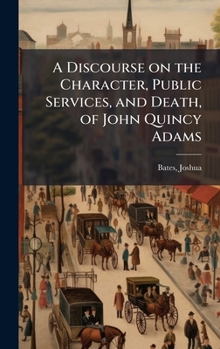A Discourse on the Character, Public Services, and Death, of John Quincy Adams
Select Format
Select Condition 
Book Overview
"A Discourse on the Character, Public Services, and Death, of John Quincy Adams" offers a detailed account of the life and career of one of America's most influential statesmen. Joshua Bates delivers a commemorative oration, reflecting on Adams's profound impact on American political thought and national development. This discourse explores Adams's contributions as a diplomat, Secretary of State, and President, highlighting his unwavering commitment to public service and his significant role in shaping early American foreign policy and domestic agendas.
Bates's eulogy not only recounts Adams's achievements but also delves into his character, providing insights into the principles and values that guided his actions. This work serves as a valuable historical document, offering a window into the political landscape of the 19th century and the life of a man who dedicated his life to the service of his country. It is essential reading for anyone interested in American history, political science, and the lives of the nation's founders.
This work has been selected by scholars as being culturally important, and is part of the knowledge base of civilization as we know it. This work was reproduced from the original artifact, and remains as true to the original work as possible. Therefore, you will see the original copyright references, library stamps (as most of these works have been housed in our most important libraries around the world), and other notations in the work.
This work is in the public domain in the United States of America, and possibly other nations. Within the United States, you may freely copy and distribute this work, as no entity (individual or corporate) has a copyright on the body of the work.
As a reproduction of a historical artifact, this work may contain missing or blurred pages, poor pictures, errant marks, etc. Scholars believe, and we concur, that this work is important enough to be preserved, reproduced, and made generally available to the public. We appreciate your support of the preservation process, and thank you for being an important part of keeping this knowledge alive and relevant.





